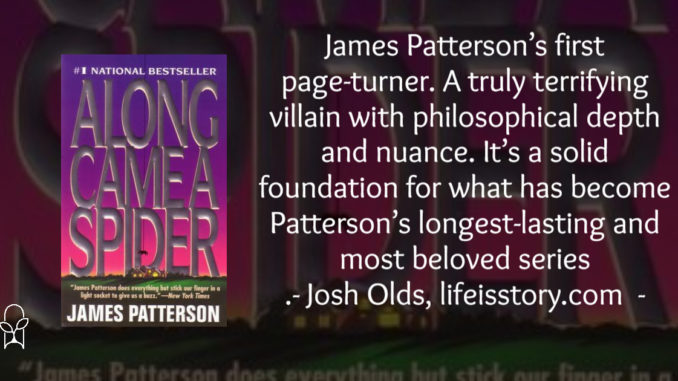
Also by this author: 1st to Die, 2nd Chance, 3rd Degree, The Horsewoman, 4th of July, The 5th Horseman, The 6th Target, 7th Heaven, The 8th Confession, The 9th Judgment
on February 1, 1993
Genres: Fiction, Suspense, Thriller
Buy on Amazon
Goodreads

The classic thriller that launched the Alex Cross series, the #1 detective series of the past twenty-five years!
A missing little girl named Maggie Rose . . . a family of three brutally murdered in the projects of Washington, D.C. . . . the thrill-killing of a beautiful elementary school teacher . . . a psychopathic serial kidnapper/murderer who is so terrifying that the FBI, the Secret Service, and the police cannot outsmart him - even after he's been captured.
Gary Soneji wants to commit the crime of the century. Alex Cross is the brilliant homicide detective pitted against him. Jezzie Flanagan is the first female supervisor of the Secret Service who completes one of the most unusual suspense triangles in any thriller you have ever read.
Alex Cross and Jezzie Flanagan are about to have a forbidden love affair--at the worst possible time for both of them. Because Gary Soneji is playing at the top of his game. The latest of the unspeakable crimes happens in Alex Cross's precinct. It happens under the noses of Jezzie Flanagan's men. Now Alex Cross must face the ultimate test: How do you outmaneuver a brilliant psychopath?
This is the book that would make James Patterson famous. Along Came a Spider was Patterson’s seventh novel and was published seventeen years after his debut in 1976’s The Thomas Berryman Number. If I was dividing Patterson’s career into stages, 1976-1993 would be the “languished in relative obscurity” stage. I say languished because Patterson’s early novels held some literary critical acclaim…they just didn’t sell well. Along Came a Spider was Patterson shifting styles and trying to write in what’s now the typical Patterson style—simple dialogue, no-frills plot, short chapters, and cinematic flair. And it worked. I mean, sure, there are people who despise it. Look at Goodreads and there are over 20,000 one- or two-star reviews. But there’s over 335,000 four- and five-star reviews.
The novel follows Alex Cross, a Washington D.C. homicide detective, as he tries to solve multiple crimes. Alex isn’t just a homicide detective, he’s a psychologist who has a knack for getting into the minds of the worst killers there are. Gary Soneji fits that description. When the police manage to capture Soneji, that’s just the beginning. His kidnapped victim, a young girl named Maggie Rose, is nowhere to be found. And to complicate matters, it seems like Soneji truly doesn’t know what happened to her. And he might not be Soneji.
As Cross investigates further, he begins to wonder of Soneji—real name Gary Murphy—might be have multiple personalities. While the MPD/DID plotline is overdone at this point, in 1993 it was still a solid storyline. Today, there would be concerns about vilifying a medical diagnosis and rightfully so. But what makes that such a compelling storyline is because we want to believe that humans are not capable of such violence and hatred. We want to believe that something “other” had to have done it. We refuse to believe the depths of evil that “normal” people are capable of. As a psychologist, Cross is tasked with talking to Murphy, trying to bring out the Soneji personality—or determine if there is one—and get some clue as to where his kidnapped victim might be.
Meanwhile, Alex begins a romantic tryst with Secret Service agent Jezzie Flanagan. Jezzie is on the case because one of the kidnapped victims had been the son of the Secretary of State under Secret Service protection. Jezzie’s protection. As the two combine forces to save Maggie Rose, they also develop a relationship that Alex wondering what the next step might be.
Plot twists abound and surprises await. Along Came a Spider isn’t a great novel. There are as many plot holes as plot twists. Some of the plot twists stretch the bounds of credulity. Alex and Jezzie’s scenes are the weak point of the book. They’re shoddily-written and poorly-developed, only there to set up a Big Twist. But the rest? It’s James Patterson’s first page-turner. A truly terrifying villain with philosophical depth and nuance. It’s a solid foundation for what has become Patterson’s longest-lasting and most beloved series.
